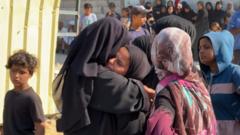Israel's recent moves to allow aid airdrops and implement temporary military pauses are receiving mixed reactions. While the IDF claims these actions are meant to improve the humanitarian response in Gaza, many see them as an insufficient gesture to appease international condemnation.
Israel Responds to Gaza Starvation Criticism with Humanitarian Measures

Israel Responds to Gaza Starvation Criticism with Humanitarian Measures
In the face of international outrage over Gaza's humanitarian crisis, Israel has announced new measures aimed at alleviating aid shortages while drawing ire from its critics.
The Israeli government has faced sharp criticism for its role in what many describe as a humanitarian catastrophe unfolding in Gaza. International bodies, including the UN, have called for urgent actions to alleviate starvation and ensure humanitarian corridors are respected. The recently announced airdrops of aid and a “tactical pause” in military operations have been deemed inadequate by various observers. Criticism intensified after the IDF carried out airstrikes even during periods designated for humanitarian relief, drawing accusations from Hamas of deception.
The IDF's measures, including the introduction of designated humanitarian corridors and new systems for distributing aid, seem aimed at countering claims of intentional starvation. However, these efforts have not quelled the skepticism from European allies and humanitarian organizations. The UN has raised alarms that the operational changes fail to address the ongoing suffering of the population, as reports indicate rampant starvation among Gazans.
Despite Israel releasing footage of aid airdrops, experts assert that such methods are inherently flawed, providing minimal relief in the face of extensive needs. The complexity of safely delivering humanitarian assistance to an area under siege poses significant challenges, with many in Gaza forced into desperate measures to secure food and resources.
The pressing humanitarian crisis in Gaza persists as logistical obstacles complicate aid delivery, resulting in an urgent call for a more comprehensive and permanent ceasefire. Humanitarian experts emphasize that merely dropping aid from aircraft is not a viable solution and that efforts must focus on restoring safe, consistent access for ground convoys to effectively address rampant starvation conditions faced by the population.
As international scrutiny grows, the effectiveness of Israel's gestures in responding to humanitarian needs remains to be seen. The situation continues to evolve amid ongoing military operations and the pressing need for genuine humanitarian solutions.
The IDF's measures, including the introduction of designated humanitarian corridors and new systems for distributing aid, seem aimed at countering claims of intentional starvation. However, these efforts have not quelled the skepticism from European allies and humanitarian organizations. The UN has raised alarms that the operational changes fail to address the ongoing suffering of the population, as reports indicate rampant starvation among Gazans.
Despite Israel releasing footage of aid airdrops, experts assert that such methods are inherently flawed, providing minimal relief in the face of extensive needs. The complexity of safely delivering humanitarian assistance to an area under siege poses significant challenges, with many in Gaza forced into desperate measures to secure food and resources.
The pressing humanitarian crisis in Gaza persists as logistical obstacles complicate aid delivery, resulting in an urgent call for a more comprehensive and permanent ceasefire. Humanitarian experts emphasize that merely dropping aid from aircraft is not a viable solution and that efforts must focus on restoring safe, consistent access for ground convoys to effectively address rampant starvation conditions faced by the population.
As international scrutiny grows, the effectiveness of Israel's gestures in responding to humanitarian needs remains to be seen. The situation continues to evolve amid ongoing military operations and the pressing need for genuine humanitarian solutions.


















